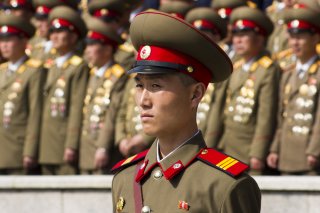What Does the Team Up with North Korea Tell Us About Russia?
Ultimately, Pyongyang gains more from this deal than Russia.
North Koreans are involved in combat on European soil. Not that long ago, such a headline would have triggered disbelief or amazement. But in this day and age, the fact that Pyongyang would go to such lengths in supporting Moscow’s war against Ukraine should come as no surprise.
Russia is going all in when it comes to its special military operation and the parallel fight against the West. Having North Korea onside, a rogue country sanctioned by the UN, can only strengthen Moscow’s position. Since 2022, Pyongyang has become one of the Russian military’s principal ammunition suppliers from abroad.
Since last August, North Koreans have reportedly shipped 3 million rounds of 152-millimeter artillery shells, the main caliber Russia and its Cold War-era allies both rely upon. Kim Jong-un’s troops are now fighting in the Russian Federation’s Kursk region, part of a counteroffensive aimed at dislodging the Ukrainian forces.
The Kremlin sees no risk in bringing the North Koreans to the frontlines, despite reports that the Chinese leadership is not exactly thrilled. As all bets are off, Russia is not averse to undermining several UN Security Council resolutions that it originally endorsed.
The benefits for North Korea are straightforward, too. Kim is relishing an opportunity to bloody some elite units, providing them with real-time frontline experience, which could prove useful in a putative clash on the Korean peninsula.
As Russia is paying, Pyongyang could also make money by taking the lion’s share of its mercenaries’ earnings. Much like Russia itself, the North Korean regime defies an international order that seeks to it. It proves its capacity to be a spoiler, far away from the homeland, which raises its overall political stock.
For all its symbolic value, the impact of the North Korean deployment should not be exaggerated.
The 8,000 to 12,000-strong contingent is not likely to make a huge difference on the battlefield, where Russia’s daily casualty rates are reaching staggering levels. Though these are elite forces on paper, their performance might turn out to be wanting.
For one, they are likely to experience difficulties in integrating with their Russian counterparts and the overall chain of command due to the language barrier. Indeed, there is already a report about Russian servicemen coming under friendly fire from North Koreans. All things considered, Russia does not gain all that much from bringing in Kim’s troops.
Pyongyang could be cashing in most of the profits from the transaction. Reliance on North Korea points to a major weakness for the Russians. Instead of soliciting support from far-away partners such as the North Koreans or Iranians, whose services and supplies do not come for free, Moscow could have rallied its “allies” from the Collective Security Treaty Organization.
On the top of the list is Belarus, where the regime’s stability hinges on Russia’s military muscle. Furthermore, Belarusian troops speak Russian, use Russian kits, and practice regularly with their Russian colleagues. However, while Belarus provided a launching pad for the initial phase of the Ukraine invasion, it is now keeping a low profile.
Belarus’ president, Aleksandr Lukashenka, is happy to recover at least some of his lost room for maneuver vis-à-vis Russia.
Russia presents itself as the spearhead of a worldwide struggle against the West. It uses every opportunity to demonstrate that its friends in order to constitute a cohesive bloc, lately during the BRICS+ summit in Kazan, Russia.
Rather, you have countries like Iran and North Korea willing to take a gamble on Russia’s war, making money and scoring political points. The great majority, including China, the big beast in the room, prefers to hedge bets and work with both Moscow and its Western adversaries. North Korea is the exception, not the rule.
Dr Dimitar Bechev is the Director of the Dahrendorf Programme on Europe in a Changing World based at Oxford's European Studies Centre. He is also a Senior Fellow at Carnegie Europe. His books include Turkey under Erdoğan (Yale UP, 2022), Russia Rising: Putin's Foreign Policy in the Middle East and North Africa (IB Tauris, 2021), and Rival Power: Russia in Southeast Europe (Yale UP, 2017).
Image: Shutterstock.

